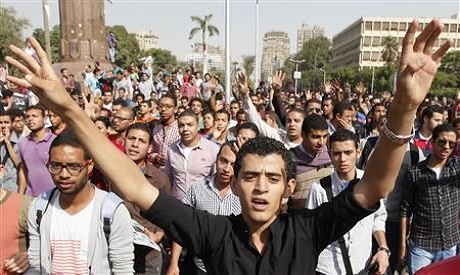
Cairo university students and members of the Muslim Brotherhood shout slogans against the military in front of Cairo University in Cairo, October 8, 2013. (Photo: Reuters)
The committee to review the cases of Egyptian youth prisoners held a consultation session Wednesday to lay out its organisational procedures, a committee member told Ahram Online.
The committee agreed to hold their first meeting next Saturday.
"The committee will begin with the cases of students awaiting trial before moving on to other cases, in an effort to save the detained students' futures," Karim El-Sakka, a former member of President Abdel-Fattah El-Sisi's electoral campaign and member of the committee, told Ahram Online Thursday.
The committee has not announced the names or number of the prisoners to be reviewed yet; however, members of the National Council for Human Rights are encouraging Egyptian families to fill out applications with the cases of their detained relatives and submit them to the council.
The freedoms committee of Egypt's press syndicate announced on Wednesday that it sent a list of 29 detained journalists to the committee, as well as to the National Council for Human Rights and the parliament's human rights committee, to be included on a list of prisoners entitled to legal pardons.
The committee was formed last Tuesday upon the recommendation of the National Youth Conference held in Sharm El-Sheikh in October, the committee is tasked with reviewing the cases of young people held in pretrial detention.
The initiative comes amid ongoing international criticism of the increasing number of political prisoners in Egypt, and was met with scepticism by some activist groups. The appointment of some committee members known for their stated positions against releasing prisoners drew severe criticism.
"In the first phase the committee will deliver a list of detainees pending trial. In the second phase the committee will begin a discussion with the president to include the names of those already sentenced," the committee's head and member of the National Council for Human Rights Mohamed Abdel Aziz told Ahram Online on Sunday.
Abdel Aziz said the committee would likely prioritize prisoners with health problems, cases with difficult circumstances — such as having two members of the same family in detention — and students.
Short link: